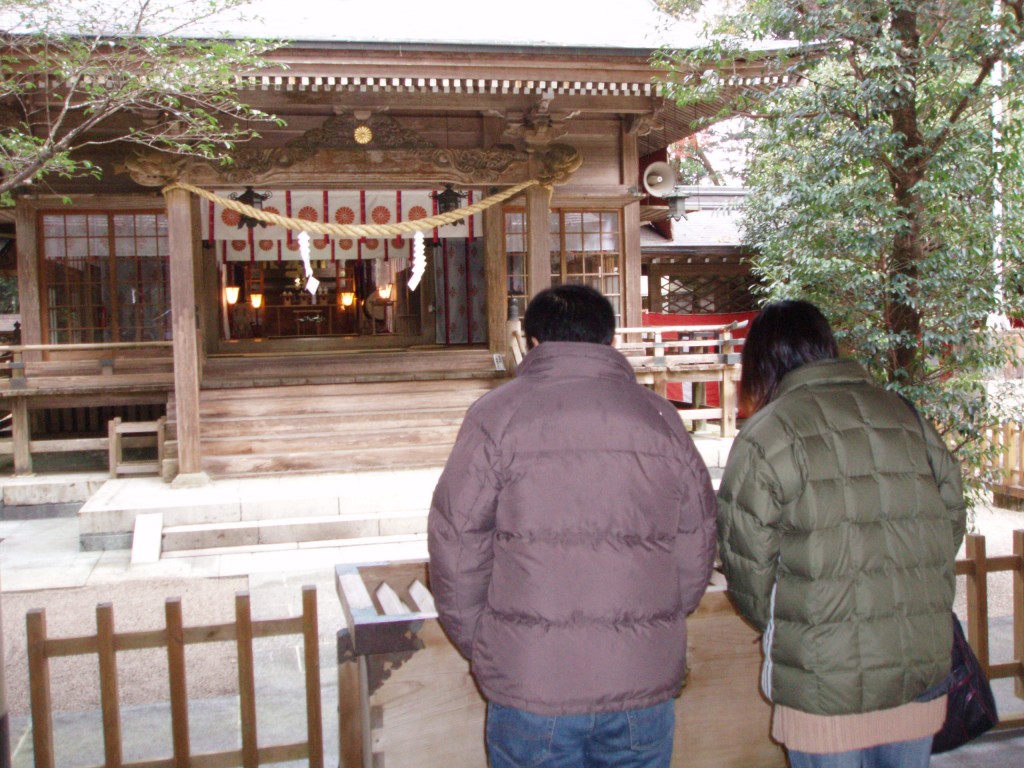
Paying respects at a shrine may simply involve compliance with convention, but does that make one a Shintoist?
Green Shinto friend Anu has written recently of the difficulties involved in defining Hinduism. The piece can be found on her blog, www.allabouthinduism.info, and comes at a time when Hindu politics are very much in the news through the likely victory in the coming election of the Hindu Nationalist BJP. The similarities with Shinto are striking, so much indeed that with a few modifications to the following article it would virtually be possible to substitute Shinto for Hinduism. It certainly gives food for thought…
************************************************
What makes a Hindu ?
I have been pondering over this question for a while. And the truth is I am struggling to come up with a clear definition. It has been equally hard to find an academic definition that works.
Simply speaking, ‘Hindu’ is a term given to and adopted by the people who lived on the other side of the Sindhu River i.e the Indian sub-continent. This is primarily a geographical definition and is both inadequate and largely irrelevant in our times. There are as many non-Hindus in India today as there are Hindus outside India.

People pay respects to the kami in different ways, but can one say they are following Shinto?
One could say a Hindu is a person who follows Hinduism. Which is true to some extent but not entirely and not as simple as it sounds. ‘Following Hinduism’ takes many forms. For under the umbrella of Hinduism there are myriad sects, traditions and schools of thought. Some shockingly different from each other yet co-existing as part of one.
For instance,while a majority of Hindus worship the extensive pantheon of gods, there is a section that worships only the nameless, formless form of God. While some believe in the non-dual aspect of God many others believe there is a fine veil that separates individual consciousness from the cosmic consciousness and the two can never truly merge.
The gods themselves look different and are called by different names across various regions. Same festivals are celebrated in various ways and traditions too have their regional differences. Even the popular mythological tales have their own regional flavour, meshed with local folklore and told in regional languages.
To make matters even more complicated, different Hindus may follow some or neither of these traditions, subscribe to some or none of these beliefs and still hold on to their Hindu Identity. Furthermore, you may be an atheist, not believe in God and still be a Hindu.

Following Shinto practices such as receiving fortune-telling slips does not necessarily make one a believer in the kami
Perhaps, a Hindu is determined by birth. Yes, that is often the case but not always. Increasingly, across the world, there are many who are not born into Hindu households yet adopt some of its tenets and consider themselves Hindus. At the same time there is no concept of conversion in Hinduism. You are a Hindu if you think you are !
With no single founder or authority at its centre, Hinduism has evolved organically over a long period of time. There is no single text laying out the rules of conduct or answers to existential or ethical questions. In fact, in Sanskrit there is no real equivalent of the word ‘religion’ [there was no word for religion in Japanese until modern times].
To give a religious identity to a group of people based on a such a diverse social system leads to stereotypical definitions. For example, Hindus follow the caste system, have several gods, believe in idol worship, are vegetarians, view cows as sacred etc, etc. All of which are true only in part. There are of course some common beliefs like karma or re-incarnation but these beliefs are not confined to Hinduism alone.
In short the Hindu identity is as complex as Hinduism itself and almost impossible to define without falling into stereotypical cliches. I personally think that for a Hindu identity stems as much from a sense of shared heritage and culture (either by birth or by choice) as it does from belonging to a religious group or praying to certain deities. Sometimes even more so.

a Hindu does not belief in any standard central religious dogma. My beliefs of god may be completely different from my parents but I will remain as good Hindu as my parents. A Hindu can be a atheist, agnostic, polytheist, monotheist, and even pantheistic. There is no central doctrine or dogma in Hindu tradition, which binds a Hindu into a particular belief system.
Hindu traditions encourage personal seeking of truth/god. Personal experience of god/truth is the most important in life. Hindus belief there can be numerous ways to seek and experience the god. If you are a seeker then, your belief will change with the (Karma) experience of the world and time(Samsara). Hindus are seeker of God , not believers of god. Hence a person’s belief is not at all important
Hindu Religious Texts are mere road indicators. No Hindu text demands supreme authority like Bible or Quran. As Hinduism has a multitude of paths; there is a text for each path you follow. So if you are a seeker at any level of your consciousness (Chetana) you will find a path and a Hindu text supporting your path. Once again there is no fight for what you believe because your belief will change with the level of your consciousness (which is ever growing in nature).
Thank you very much for that input. It provides a succinct overview of what seems to be a very complex area regarding Hindu belief. I like the idea of Hindus being ‘seekers’ rather than ‘believers’. That perhaps is different from Shinto. But a lot of the other things you write are certainly applicable to Shinto as well…
A Hindu is a person who believes his “jeeva-athma” is part of “param-atma” the Brahman. This is called “advaita” philosophy that is also understood as “non-dualistic”. Our beloved Acharya whom all Hindus follow is “adisankaracharya” he specifically talks about humans and all loving and non living to be a part of highly conscious Brahman,
Hindus have 3 ways to attend moksha(no rebirth or one with Brahman)-
1. By being karma yogi (do good, work hard and be controlled and kind in your thoughts and actions) example- ramakrishna missions and Shankar netralaya that offer assistance for poor.
2. By being Gyan yogi- renowned saints who have understood the relation of human with God and have no use for materialistic life.example- adisankaracharya,Ramana Maharishi.
3. Bhakti yoga- people who pray, sing bhajans and have reverence for God example tulsi, soor Das. Hindus need to only understand” he is part of Brahman..there are no other requirements for a Hindu”
unlike abrahamic religions that require hatred for other religions to prove their allegiance to their religion.